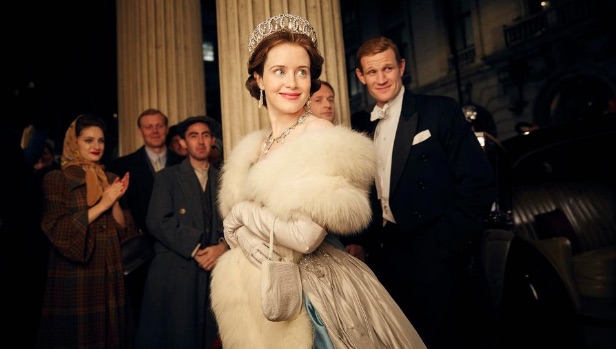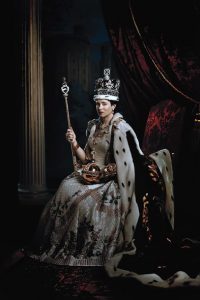
“The Crown”: A Not So Crowning Achievement
No sooner had I admired the realistic, mostly balanced and accurate PBS docudrama Churchill’s Secret (on the Prime Minister’s June 1953 stroke) than I was grumbling through Netflix’s The Crown, which was, sadly, as often misleading as Churchill’s Secret was truthful. Thank heaven it’s over (2023).

Started well
The first season, said to be Netflix’s most costly to date, started off well enough. Jared Harris is a convincing King George VI, capturing his established mannerisms and attitudes, his desperate illness. Alex Jennings is painfully accurate as his spoiled brother, the Duke of Windsor: petty, selfish, convinced he is victim of a family plot.
Claire Foy is an honest Elizabeth II, inherently intelligent but abysmally schooled, except in the Constitution—as indeed her biographers suggest. (Like the young Churchill, she engaged in a determined self-education.) Matt Smith is a less accurate Prince Philip, given to acting the foolish playboy, lamenting his emasculation as Queen Consort, making racist jibes at native warriors in Kenya and lewd proposals to his spouse. Vanessa Kirby is a believable Princess Margaret, though hardly, per the Radio Times, “The Princess Diana of her day.” Dame Harriet Walter is a graceful Clementine Churchill, though she gives the impression at times of a housekeeper.

John Lithgow is a passable Churchill. He is good on the voice and mannerisms, minimizing his 6’4” stature with a body suit that gives him a stoop, and by sitting most of the time. Unfortunately, the words put in his mouth by the screenplay contribute to a cartoonish image far from reality.
Red herrings
We were soon simmering over Churchill’s fictitious jibes at Prime Minister Attlee—the old “empty taxi” and “sheep in sheep’s clothing” canards—and the assertion that Churchill was drunk at the Coronation. Lithgow’s Churchill is not like the real person. He is invariably a wheezing old gaffer, clinging stubbornly to power, which may have been true at times after his 1953 stroke, but not earlier.
About that stroke. An episode tells of the Queen’s shock, long after the fact, learning that Churchill and his deputy, Anthony Eden, were simultaneously out of commission, and the country leaderless, in late June 1953. She summons Lord Salisbury (Clive Francis) and the PM himself, for a dressing-down. She scolds them like an upper-class nanny, a bystander says.
Good line! Except that it never happened and distorts reality and the characters.
The truth
Three days after Churchill’s stroke, the Queen inquired about his illness: “I am so sorry to hear from [private secretary] Tommy Lascelles that you have not been feeling too well these last few days. I do hope it is not serious and that you will be quite recovered in a very short time.” (Martin Gilbert, Never Despair 1946-1965, 852.)
Thrilled by her letter, Churchill told all. He wrote her “a remarkable document with its poise, proportion and sense of detachment…. he recalled the circumstances in which he had been stricken down; spoke of his plight as he lay in bed as if it had happened to someone else; told Her Majesty that he was not without hope that he might soon be about and able to discharge his duties until the Autumn when he thought that Anthony would be able to take over.” (Lord Moran, Churchill: The Struggle for Survival, 440-41.)
Churchill’s private secretary Jock Colville added that on August 2nd, “I went with W. to Royal Lodge where he had an audience of the Queen. He said that he had told her his decision whether or not to retire would be made in a month when he saw clearly whether he was fit to face Parliament and to make a major speech to the Conservative Annual Conference in October.” (John Colville, Fringes of Power, Downing Street Diaries 1939-1955, 673)
No Crown for Realism
Episode 9, on the infamous Graham Sutherland 80th birthday painting (dubbed “a lost masterpiece”) goes off the rails again. The inaccuracies would be boring to catalogue. Churchill’s sittings with the artist include fictitious conversations that may or may not be accurate—of course there is a need for dialogue. But weird impressions dominate. Churchill paints his Chartwell fishpond “again and again.” Apparently this symbolizes his severe despondency and depression. If he painted the fishpond more than twice, we have yet to see the evidence.
Is it really so big a deal? Not in itself. The trouble is, it advances ignorance. It’s only drama, people will say. But as a result we will soon read on the web how Churchill’s stroke was kept from the Queen. How he “forced” the Royal Couple to move from Clarence House. And how he painted a scene repeatedly in his Black Dog of despair.
Why do producers distort the past and expect people to believe it? Because most will? Because the screenwriter will appear at some Churchill event, praised for his achievement in selling a million copies?
Uneducated cheers are already starting. The Crown, writes Vanity Fair, features a “two-hander sequence between Lithgow’s enfeebled Churchill and [Stephen] Dillane’s probing Sutherland. That riveting scene starts with a simple goldfish pond and ends in manly, restrained tears. It is exactly the kind of thing that makes The Crown such refreshingly restrained-yet-irresistible television.”
More and more I realize that truth and accuracy matter less and less. Style and perception are everything. Reality bends to fit the creator’s mindset.







2 thoughts on ““The Crown”: A Not So Crowning Achievement”
Yes it crosses more red lines than the musical Camelot.
–
But wasn’t Camelot uplifting? This is just depressing. RML
Do you realise that this is a drama show, not a documentary? Not once has it ever claimed to be what you expect it to be – an entirely accurate retelling of history. It would be boring and nobody would watch it. It’s up to the viewer to find out for themselves what is / isn’t fiction, if they choose to. Just as you would with any other film / TV show that’s based on real events.
=
Yes, I do realize it’s drama, thanks very much. Everybody understands drama requires fictitious dialogue to fill out a script. An example of the right way to write this is in the “Darkest Hour” underground scene, which everyone knows didn’t happen but accurately reflects the spirit of Londoners at that time.
.
That kind of dramatic license doesn’t distort reality, it amplifies it. “The Crown” does the opposite, vesting characters with words and attitudes they’d never adopt in real life, apparently in the name of skewing history. Yes, I’m sure “The Crown” aims not to “bore” us with its ahistoric dialogue, but if that’s what it takes, it’s just another example of the onward march of invincible ignorance. History is not boring. You should try it. RML
Comments are closed.